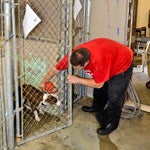More strays roam streets during summer
Published 3:16 pm Friday, July 19, 2013
Cases of stray animals roaming around Chilton County have increased in the last few months, according to county officials and Humane Society employees.
Statistics indicate the number of unconfined dogs and cats found normally increases in the summertime because of the warm weather.
Without countywide leash laws in place, residents are urged to know and obey laws regarding animal control in each of Chilton’s four municipalities, which are Clanton, Jemison, Thorsby and Maplesville.

Chilton County Humane Society employee Jonathan Doyle takes Tesa, an 8-month-old pit bull terrier, out of her kennel to play outside. Tesa was brought to the shelter as a stray about two weeks ago.
Alabama law states animals must have inoculation (rabies) tags and should be confined to their owners’ property or by a leash.
Animal Control Officer Chris Whittle with the Clanton Police Department said Clanton has an ordinance stating dogs may not run along public streets or sidewalks in the city if they do not have inoculation tags.
Whittle said dogs can run without a leash if they are wearing an inoculation tag and the owners are present, but they may not become a nuisance to any other person while doing so.
Whittle has been with the department for nearly six years and said animal control in Clanton has improved since he started.
“When I first started, no one had their dog put up,” Whittle said. “From six years ago, it’s improved a bunch.”
Whittle said the majority of the complaints he receives are residents reporting a stray animal in their yard.
Punishment for not complying with the city’s leash law can result in a warning, a non-traffic citation or a court date, depending on the animal owner’s compliance.
Whittle said owners whose animals are continually found or reported as not being confined by leash, fence or other means are subject to a citation each time, up to the officer’s discretion.
“If you don’t comply with it, you just keep getting tickets,” Whittle said. “If I catch the dog, I’ll take it to the Humane Society. The Humane Society goes ahead and vaccinates them to keep the animals safe.”
Code Enforcement Officer Bobby Tucker with the Alabama Animal Control Association handles animal issues in Jemison and Thorsby and said animals in these areas must also be on a leash or confined to their owners’ yards by a fence or other means.
Tucker said most of the time, an animal’s primary source of identification (usually a collar) stays in the location where the animal broke free.
One way owners can ensure their pets are returned to them if they escape confinement is by having the animal implanted with a microchip.
Microchips cost about $25 each and allow officers to identify a wandering animal and return it to its owner before it would be dropped off at the Humane Society as a stray.
“If everybody would microchip, if we do get stray we can check it and we can get it home the same day,” Tucker said. “It would be a lot better if you had one involved in a bite or something like that. You would have all information you needed.”
Officials in Maplesville announced in June they would be enforcing the town’s leash law more strictly in response to an increase in animal complaints and one reported dog bite incident.
Maplesville’s animal ordinance prohibits non-domestic animals and dangerous animals considered nuisances and defines “dangerous animals” as those that have: caused bodily injury or disfigurement to a person; engaged in an attack on a person possibly resulting in danger to his or her personal safety; inflicted or attempted to inflict bodily injury to a person or other animal; exhibited unusually aggressive behavior, such as an attack on another animal; or bitten one or more person(s).
Ordinance No. 139 was adopted on July 12, 2011, following previous ordinances establishing the leash law. It provides a more extensive description of “dangerous” animals, both domesticated and non-domesticated, and includes dogs, cats, reptiles and snakes.
The town’s first ordinance addressing animal control was Ordinance No. 113, signed and effective beginning Feb. 13, 1995.
The ordinance stated that dogs have to be inoculated, or vaccinated, and are required to wear shots tags.
On May 9, 2005, the town adopted Ordinance No. 128, which added to the previous ordinance that “dangerous” dogs must be restrained.
According to the current ordinance (No. 139) addressing the leash law, domesticated animals must be on a leash or kept in a fenced yard.
The town issues a written warning to the owner of an animal upon the first complaint involving the animal.
Upon the second complaint involving the same animal, the owner will receive a written citation, orders to appear in court and could pay fines plus court costs up to $198.
Chilton County Humane Society Director Jessica Terry said every animal dropped off at the shelter is vaccinated upon intake.
Terry said part of the animal control problem stems from pet owners not having their dogs and cats spayed or neutered.
“June and July are notorious for (being) the busiest months for a shelter, normally because of the heavy intake because of puppies and kittens,” Terry said. “The number is always high. I really, really push spaying and neutering your animals.”
Terry said having more animals fixed cuts down on the shelter’s intake and reduces the population of stray animals needing homes.
In the last year, the shelter took in 2,687 animals including those dropped off by municipal employees.
About 100 dogs and cats were returned to their owners, 235 were transferred to a rescue organization and 297 were adopted within one year of being delivered to the shelter.
The shelter took in 185 animals from July 1–15 alone.
The shelter holds stray animals for seven days after they are dropped off to give owners a chance to reclaim them.
Terry said the shelter no longer charges a drop-off fee for animals brought from somewhere in the county.
“There was a period where we started charging for in-county animals because funding was so low, just so we could take care of the animals,” Terry said. “Now, the county is funding us so we’re not charging for in-county animals.”
For more information, contact the Chilton County Humane Society at (205) 755-9170.






